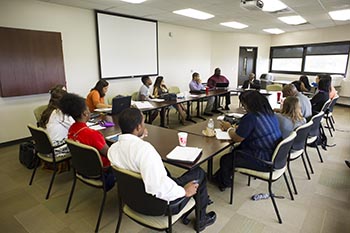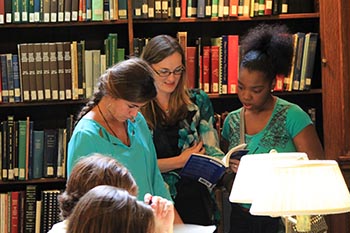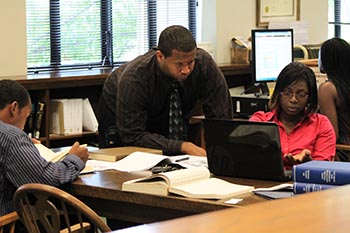University of Alabama at Birmingham (UAB) business students have partnered with Birmingham high-school students to examine the city’s history and their role in the community in a new way.
 Rev. Calvin Woods addresses the studentsAs Birmingham commemorates the seminal events of the Civil Rights Movement in 1963, the School of Business Student Scholars program joined juniors and seniors from Holy Family Cristo Rey Catholic and John Carroll Catholic high schools to examine ways the movement affected business in the city.
Rev. Calvin Woods addresses the studentsAs Birmingham commemorates the seminal events of the Civil Rights Movement in 1963, the School of Business Student Scholars program joined juniors and seniors from Holy Family Cristo Rey Catholic and John Carroll Catholic high schools to examine ways the movement affected business in the city.
“This is a unique opportunity, for ‘50 Years Forward’, to think about what we could do that was special,” said Eric Jack, Ph.D., dean of the School of Business.
UAB students led teams of students, one from each high school, through a research project focusing on a particular decade since 1963. Using archives and data on demographics, employment and key industries, the students compiled an analysis of each decade to benchmark against the economic development of nearby Atlanta, Memphis and Nashville.
In October, the students will present their work at the Sixteenth Street Baptist Church and display their projects in the Birmingham Civil Rights Institute.
“Students learn best by doing,” Jack said. “They learn by being leaders, and we want our students to be leaders in the community.”
 Students gather information in the Birmingham Public LibraryIn past summers, the Business Student Scholars Program has brought students to Alabama’s Black Belt to develop plans for cultivating bamboo to drive economic growth and promote local tourism. Program leader and Instructor Nathan Oliver proposed keeping students in Birmingham this year.
Students gather information in the Birmingham Public LibraryIn past summers, the Business Student Scholars Program has brought students to Alabama’s Black Belt to develop plans for cultivating bamboo to drive economic growth and promote local tourism. Program leader and Instructor Nathan Oliver proposed keeping students in Birmingham this year.
John Carroll senior Bayley Smith focused her research on the immediate business impact of the movement from 1963-73. “I’ve learned that Birmingham had fallen and picked itself up again,” she said. “Birmingham has come so far.”
“On a business and academic level, they’re learning where the city has been and where it’s going,” said Ariel Smith, a UAB junior in human resource management. “Depending on your time frame, Birmingham could be Bombingham, the Magic City or the All-American City. Birmingham isn’t just one of those names.”
During the two-week program, students heard accounts of Birmingham’s history from Mayor William Bell, former Mayor Richard Arrington, Civil Rights leader Rev. Calvin Woods and others.
Woods and his brother, the late Abraham Woods, were on the front lines of the movement by 1963. He recounted that the boycotts put pressure on the city’s business community in hopes that business leaders would call for desegregation.
“I want you to know that progress has been made because we stood up,” Woods told students. “Folks you might not know about paid a big price. There’s more to the movement than you’ll read about in books.”
Bell, a student at the now-closed Immaculata Catholic School in 1963, recalled initially being unaware of the movement fomenting in Birmingham, though he soon joined in.
 Students compare data at the Birmingham Public Library“Segregation was a way of life — it was because it was,” Bell said.
Students compare data at the Birmingham Public Library“Segregation was a way of life — it was because it was,” Bell said.
UAB senior Vincent Long Jr., a human resource management major, had been taught Birmingham’s history in grade school in “bits and pieces,” he said, but this project gave him “a true perspective on what really happened.”
Holy Family junior Dante Campbell also appreciated the chance to get an in-depth history lesson through the “small, but large details” of business development and the accounts of guest speakers such as Woods, he said.
Bell told students that Birmingham is putting essential pieces in place for renewed vitality.
“After all these years, people look at inner-city life in Birmingham differently,” Bell said. “In spite of our past, we’re moving forward.”